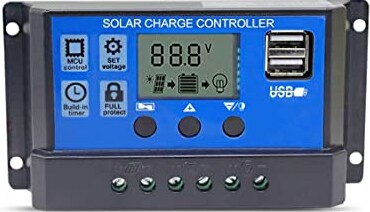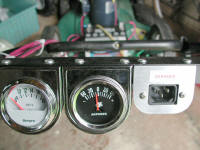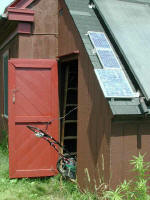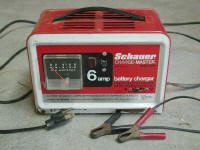|
|
|||
| Product Design | My Artwork | Living Sustainably | |
| Art Engineering | Levitation Kit | Solar Power | Chevy Volt |
| Solar Heating | Thermal Windows | ||
| Contact | About Me | Solar Hot Water | Solar Mower |
|
|
|||
| Product Design | My Artwork | Living Sustainably | |
| Art Engineering | Levitation Kit | Solar Power | Chevy Volt |
| Solar Heating | Thermal Windows | ||
| Contact | About Me | Solar Hot Water | Solar Mower |
home > solar mower
CONVERTING A GAS LAWN MOWER TO
SOLAR CHARGED ELECTRIC POWER
| HOME | PARTS LIST |
REMOVING GAS ENGINE |
INSTALLING ELECTRIC MOTOR |
INSTALLING COMPONENTS |
WIRING THE MOWER |
MOUNTING THE BLADE |
SOLAR CHARGER |
TEST DRIVE |
OTHER CONVERSIONS |
|
Solar Charging |
|
| I found an inexpensive solar charge controller on-line. These are now common and readily available and easy to install. Just connect to a solar panel and the battery. |
 |
 |
I originally planned to use an extension cord for the charging connector, but the exposed male plug on the charger side made me nervous, since the pins could short to bare metal. So I looked around for another safer option and found an old computer power connector and a heavy duty power cord for it. This way there are no exposed live connections. I mounted the connector next to the power meters on the handle. |
 Battery Charging (81K pdf file) |
Why use a charge controller? If you simply connect your solar panels directly to the battery, you will over charge it and ruin it. 12 Volt solar panels can produce over 22 Volts in direct sun and this is too much. Also when a battery reaches full charge the charging current needs to be removed or reduced to a trickle to protect the battery. That is what a Charge Controller does. It monitors the battery voltage and limits the solar voltage and current as needed to safely charge the battery. Once the battery reaches full charge, then a trickle charge is used to maintain the state of charge. |
 |
Solar Panels I had thought that 40 Watts would not be enough, but have found in practice that it is enough to re-charge the battery in 1 or 2 days of full sun after 20-30 minutes of use. So the mower is always ready to go by the time I need it. |
|
Choosing a Solar Panel You will need enough power from the panels to charge your mower before the grass gets too long. There are a lot of variables to consider if you are using different parts than I did:
I happen to have 40 Watts of panels on
my workshop roof that I use to run my
solar heating system pumps in the winter months, so I can switch them
over to charging duty in the summer. In the overlap months where I
need both heating and charging I just use a battery charger (see below).
Since we have opted to get our electricity from wind power it is clean
power by default. If you have the option of selecting your
electric supply then consider switching to green sourced electricity.
We also have a 4kW solar array
that produces enough power to spin the meter backwards on sunny days -
so even using a plug-in charger is "solar powered" in our home. |
|
 |
Alternate
Charging Method The other way to charge the mower that I use on cloudy days is a good old fashioned automobile battery charger. Mine is an automatic unit that is relatively inexpensive. You can find them at Sears or auto parts stores. My 6 Amp unit will recharge the mower in 3-6 hours depending on how depleted the battery is. |
|
|
| HOME | PARTS LIST |
REMOVING GAS ENGINE |
INSTALLING ELECTRIC MOTOR |
INSTALLING COMPONENTS |
WIRING THE MOWER |
MOUNTING THE BLADE |
SOLAR CHARGER |
TEST DRIVE |
OTHER CONVERSIONS |